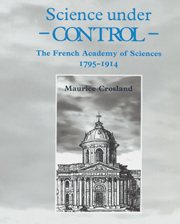Book contents
- Frontmatter
- Contents
- List of tables and figures
- Preface
- List of abbreviations
- INTRODUCTION
- 1 SCIENCE IN FRANCE
- 2 THE STRUCTURE OF THE ACADEMY
- 3 THE FUNCTIONING OF THE ACADEMY: SOME POSSIBLE ROLES
- 4 SCIENCE DIVIDED: THE SECTIONS
- 5 THE ACADEMICIANS
- 6 ELECTIONS: ‘GREEN FEVER’
- 7 REGISTRATION, JUDGEMENT AND REWARD
- 8 THE PRINTED WORD
- 9 AN ACADEMY UNDER GOVERNMENT CONTROL
- 10 ‘OUTSIDERS’: THE SCIENTIFIC FRINGE AND THE PUBLIC
- 11 THE INTERNATIONAL DIMENSION
- 12 THE CONTROL OF THE ACADEMY AND OF SCIENCE
- Name index
- Subject index
6 - ELECTIONS: ‘GREEN FEVER’
Published online by Cambridge University Press: 09 October 2009
- Frontmatter
- Contents
- List of tables and figures
- Preface
- List of abbreviations
- INTRODUCTION
- 1 SCIENCE IN FRANCE
- 2 THE STRUCTURE OF THE ACADEMY
- 3 THE FUNCTIONING OF THE ACADEMY: SOME POSSIBLE ROLES
- 4 SCIENCE DIVIDED: THE SECTIONS
- 5 THE ACADEMICIANS
- 6 ELECTIONS: ‘GREEN FEVER’
- 7 REGISTRATION, JUDGEMENT AND REWARD
- 8 THE PRINTED WORD
- 9 AN ACADEMY UNDER GOVERNMENT CONTROL
- 10 ‘OUTSIDERS’: THE SCIENTIFIC FRINGE AND THE PUBLIC
- 11 THE INTERNATIONAL DIMENSION
- 12 THE CONTROL OF THE ACADEMY AND OF SCIENCE
- Name index
- Subject index
Summary
Election is the only valid method of creating Academicians.
(Arago, Eloge of Monge, M.A.I., 24 (1854), lxxx.)The influence of an academy depends to a large extent on elections.
(Darboux, M.A.I., 47 (1904), ccclxvii.)The prospect of a place in the Academy is a stimulus, which more than once has encouraged young men of science at the beginning of their career.
(Journal des Débats, 19 September 1832.)Introduction
The reference to ‘green’ in the title of this chapter is to the dark green embroidery on the black costume of members of the Institute. The ‘fever’ may be more difficult to understand a century later. It refers to the excitement often generated by elections, an excitement which could occasionally reach fever pitch. Of course there were some elections that were hardly contentious, such as those of many correspondents where the names of provincial or foreign candidates were hardly known in the Academy generally and the members had to depend heavily on advice from the relevant section. More passion usually went into elections for full (i.e. resident) membership. Many of the contestants, who had made a practice of presenting their research to the Academy over a period of many years, would be quite well known to members. They would be resident in Paris and be fairly well advanced in their careers.
Several would be the holder of a position at one or more of the great scientific institutions of the capital, such as the Muséum d'Histoire Naturelle, or one of the grandes écoles.
- Type
- Chapter
- Information
- Science under ControlThe French Academy of Sciences 1795–1914, pp. 203 - 241Publisher: Cambridge University PressPrint publication year: 1992



